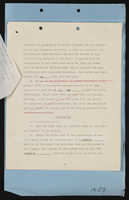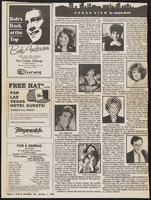Search the Special Collections and Archives Portal
Search Results
Robert Ambrose oral history interview
Identifier
Abstract
Oral history interview with Robert Ambrose conducted by David G. Schwartz on September 28, 2016 for the Slot Operations Oral History Project. Ambrose discusses the various positions he held at Tropicana Atlantic City and some of the mentors he has had throughout his career. He then provides his opinions on the technical changes of slot operations, the use of free play, and eSports.
Archival Collection
Saul Wesley oral history interview
Identifier
Abstract
Oral history interview with Saul Wesley conducted by David Schwartz on January 13, 2017 for the Slot Operations Oral History Project. Wesley discusses the distinction between the roles of a director and of a vice president in slot management. He also describes how the slot department works within various casinos such as the MGM Grand Hotel (now Bally’s) and the Monte Carlo Hotel and Casino.
Archival Collection
Steve Riback oral history interview
Identifier
Abstract
Oral history interview with Steve Riback conducted by Barbara Tabach on December 12, 2017 for the Southern Nevada Jewish Heritage Project. Steve Riback is a detective sergeant for the Las Vegas Metropolitan Police Department. He has been with the police force for nearly twenty years. He reflects on his overwhelming pride of the police on October 1, 2017. Riback recalls what he heard on his police radio, seeing the rush of police cars being dispatched, and watching a body camera video later. Sgt. Riback’s squad was assigned to Spring Valley Hospital where they worked tirelessly to identify victims, both injured and deceased. His reflections stir the image of medical professionals and police officers urgently fusing together to handle the situation at hand. Riback shares a myriad of emotions, and talks about the options available for officers to deal with their personal trauma.
Archival Collection

Don Perry interview, March 05, 1978: transcript
Date
Archival Collection
Description
On March 5th, 1978, Karen Croteau interviewed Don Perry (b. 1928 in Clarksburg, West Virginia) about Paiute Indians and life on a reservation. Perry begins by mentioning his own Indian heritage with a Cherokee mother and his wife’s Paiute heritage. Perry focuses on his conversations with his wife’s grandmother, who lived on the Paiute reservation since birth, from who he learned about the reservations history. He particularly delves into the traditions of Indian burials, governing on the reservation, and the difference between an Indian reservation and an Indian colony. Additionally, he talks about recreation on the reservations, education of Paiute Indians, and how reservations have changed. Throughout the interview, Perry gives personal anecdotes about his life in connection to the Paiute people and his experiences with their traditions and belief systems. Perry ends by discussing governing politics of the Paiute reservation and the start of Las Vegas as a gambling town.
Text

Transcript of interview with Phillip L. Cook by Richrad Strahan, March 3, 1977
Date
Archival Collection
Description
On March 3, 1977, Richard Strahan interviewed Phillip L. Cook (born 1939 in Las Vegas, Nevada) about his life in Southern Nevada. Cook first talks about his parents’ move to Nevada and then describes how the school system has changed over time. He then describes the first businesses that opened up in the Downtown and Strip areas in Las Vegas before discussing prostitution, Block 16, and recreational activities available to youth. Cook also talks about the first television sets and telephone systems made available, and he moves on to talk about the prices of things such as movies and haircuts when he was younger. The interview then moves to discussions on the Old Ranch, racial discrimination, school integration, the crime rate, and the school system in Las Vegas.
Text

Transcript of interview with William Carlson by Alice Brown, March 19, 1980
Date
Archival Collection
Description
Text

Transcript of interview with Donna Henshaw by Jeff Thompson, February 12, 1978
Date
Archival Collection
Description
On February 12, 1978, collector Jeff Thompson interviewed short-order cook and maid, Donna Henshaw (born on February 11, 1937 in Appleton, Minnesota) in the collector’s home in Las Vegas, Nevada. This interview covers the history and development of the Las Vegas area.
Text

Transcript of interview with Mae Farei by Martha Jane Cunningham, February 24, 1980
Date
Archival Collection
Description
On February 24, 1980, Martha Cunningham interviewed her aunt, Mae Farei (born 1909 in Illinois), about her experiences living in Nevada. Farei first talks about the development of the Downtown and Strip areas. She then discusses work at the Twin Lakes Lodge and Stardust as a housekeeper, and she later mentions some of the recreational activities available to those in Nevada. She also mentions the importance of Nellis Air Force Base and expresses her appreciation for living in Southern Nevada.
Text


